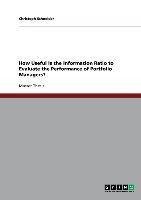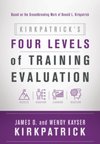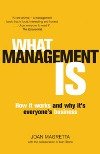
-
 Anglický jazyk
Anglický jazyk
How Useful is the Information Ratio to Evaluate the Performance of Portfolio Managers?
Autor: Christoph Schneider
Master's Thesis from the year 2009 in the subject Business economics - Investment and Finance, grade: A (German Grade: 1,0), European Business School - International University Schloß Reichartshausen Oestrich-Winkel (Union Investment Chair of Asset Management),... Viac o knihe
Na objednávku, dodanie 2-4 týždne
44.37 €
bežná cena: 49.30 €
O knihe
Master's Thesis from the year 2009 in the subject Business economics - Investment and Finance, grade: A (German Grade: 1,0), European Business School - International University Schloß Reichartshausen Oestrich-Winkel (Union Investment Chair of Asset Management), language: English, abstract: The idea of comparing the performance of different risky investments, for example investment funds, on a quantitative basis dates back to the beginnings of the asset management industry and has been an important field of research in finance since then. Performance measures serve as valuable quantitative evidence for the portfolio manager's performance as well as for the evaluation of investment decisions ex post. Based on the idea of the capital asset pricing model proposed by Treynor (1961), Sharpe (1964), and Lintner (1965), Treynor (1965) developed the first quantitative performance measure intended to rate mutual funds, the Treynor Ratio. Since then, a large number of performance measures with very different characteristics have been developed, for example by Sharpe (1966), Jensen (1968), Treynor & Black (1973), Sortino & Price (1994), and Israelsen (2005). In addition to their power of rating investments ex post, their ability to predict future performance has been thoroughly analyzed by Grinblatt & Titman (1992), Brown & Goetzmann (1995), Carhart (1997), and others. Besides academia, the driving force behind the development of more sophisticated performance measures has always been the investors. This is understandable, as "the truly poor managers are afraid, the unlucky managers will be unjustly condemned, and the new managers have no track record. Only the skilled (or lucky) managers are enthusiastic" (Grinold & Kahn, 2000, p. 478).
By combining and applying the results of previous research to a new sample of nearly 10,000 mutual funds that invest in different countries and asset c
- Vydavateľstvo: GRIN Verlag
- Rok vydania: 2009
- Formát: Paperback
- Rozmer: 210 x 148 mm
- Jazyk: Anglický jazyk
- ISBN: 9783640384310











